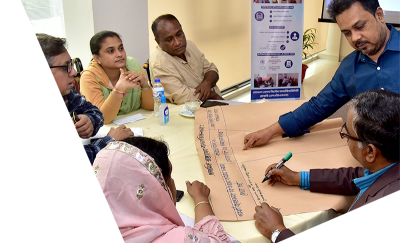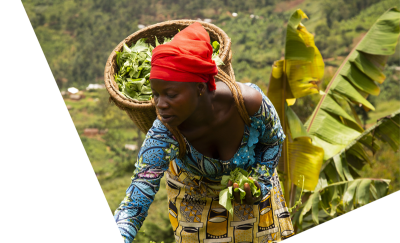Building Climate Resilience Through Private Sector Partnerships


In Zambia, the worst drought in decades has strained hydroelectricity-dependent power supplies over the past year. The energy crisis is so severe that millions of people face rolling blackouts that leave them with only a few hours of power each day. Manufacturers are shutting down or relying on diesel generators, while families are forced to cook over portable gas stoves—if they can find fuel at all. These options not only strain the wallets of families and businesses but also reduce air quality and release more greenhouse gas emissions into the atmosphere.
This is the kind of social and environmental challenge that GENESIS Energy Group aims to address as it invests in efforts to “light up Africa one community at a time.” Recently, GENESIS proposed the development of a $90 million renewable energy project in an agricultural region of Zambia’s central province, with the goal of installing energy infrastructure to generate 40 megawatts (MW) of solar power and 31 MW of wind power. This project would diversify Zambia’s energy resources, provide enough electricity to power approximately 300,000 homes, and could help the country avoid up to 60,800 tons of carbon emissions.
To realize this project, however, GENESIS needed support in securing the necessary agreements, permits, and financing. This is where the Comprehensive Action for Climate Change Initiative (CACCI) comes in. CACCI, a U.S. Agency for International Development (USAID) global program, led by Abt Global, provides technical, analytical, and capacity assistance to help countries develop and implement climate policies that benefit both the environment and marginalized communities.
CACCI also partners with businesses through its Partnership for Climate Action (PCA) platform, which helps the private sector contribute to climate resilience goals through investment and innovation. Through this platform, CACCI's Africa regional officer connected GENESIS with Zambian ministries and related agencies to help the company navigate regulatory processes and advance agreements such as Memoranda of Understanding (MOUs) and Power Purchasing Agreements. CACCI experts also connected GENESIS with Power Africa, a USAID initiative that aims to bring 30,000 MW of electricity to sub-Saharan Africa by 2030. Now, GENESIS is in discussions with Power Africa to leverage its resources to prepare bankable renewable energy projects and overcome obstacles to other energy deals across its portfolio.
Thanks in part to CACCI’s support, the company has committed to investing $2 billion in energy infrastructure across Africa over the next few years, contributing to a larger $10 billion commitment under the PCA. Since joining the PCA, GENESIS has advanced or unlocked a portfolio of 5,600 MW of projects across Africa and anticipates outcomes including the creation of 30,000 full-time jobs and a reduction of 6.65 million tons of CO2 emissions per year. GENESIS sees its collaboration with USAID and CACCI as crucial to expanding energy access and driving a just and resilient transition to renewable power across Africa.


To Meet Climate Commitments, Nations Need the Private Sector
CACCI is a five-year program designed to help countries reduce their climate impacts and meet their climate commitments. The program works with a number of organizations including the International Institute for Sustainable Development, Purdue Applied Research Institute, and World Resources Institute, as well as regional and local stakeholders. Through local partnerships and specialized tools and approaches, CACCI helps countries develop plans to meet specific emissions targets, known as Nationally Determined Contributions (NDCs), and country-level action plans to achieve those targets, known as National Adaptation Plans (NAPs). Often, CACCI works with predominantly low- and middle-income countries to craft NDCs and NAPs tailored to unique country contexts and circumstances.
The program also launched the PCA to partner with the private sector and mobilize resources crucial for achieving country-level climate plans. The PCA helps private sector partners create impactful projects aligned with business interests and climate targets, identify investment opportunities, and implement projects that reduce emissions and build climate resilience.
These partnerships can take many forms and require businesses to think outside the box. For instance, CACCI is working with GENESIS to explore whether their solar-powered refrigeration technology could reduce food waste on Zambian farms, where poor storage causes significant agricultural losses. This innovative solution could help curb emissions while also boosting farmers' incomes. It is a notable example of how businesses can use their technical expertise to tackle local climate and economic challenges in creative ways.
Additionally, CACCI experts have connected GENESIS with U.S. State Department officials who are working to link Angola, the Democratic Republic of Congo, and Zambia to the Indian and Atlantic oceans through road and railway networks. GENESIS has since committed to electrifying stretches of this multibillion-dollar project, called the Lobito Corridor, which could help create economic hubs. In line with that commitment, the company has secured an MOU with the DRC’s Haut-Katanga government for 200 hectares of land for a solar project and is advancing a 140-megawatt solar project in Zambia to connect the country’s grid to the DRC.


How Rural Wi-Fi Is Helping Improve Crop Yields
Deep in the mountains of West Java, Indonesia, in the remote village of Argamukti, a basic lack of telecommunications infrastructure leaves people without affordable internet service. This isolation complicates the community’s ability to access basic services such as education and healthcare and makes it harder for local farmers to manage weather risks and maximize agricultural productivity.
To bridge this gap, technology company Veea, which specializes in edge computing to process data quickly and locally, is providing satellite-based wireless internet to Argamukti. Thanks to this initiative, students are now able to access digital education content, and villagers no longer have to travel long distances for in-person medical consultations—they can access telehealth services right from their community.
Veea’s technology also makes it easier for industries like farming to use real-time data; farmers in Argamukti can now monitor local weather patterns, soil conditions, and crop health and make adjustments to optimize their agricultural outputs while reducing the use of water, fertilizers, and pesticides. By integrating weather and climate data into crop management, farmers can plan for droughts or heavy rainfall that risks crop damage.
To build on that success, Veea has partnered with CACCI through the PCA to expand its technology into parts of Southeast Asia and other USAID priority countries facing food insecurity. Through this partnership, CACCI has connected Veea with the Purdue Applied Research Institute and the International Food Policy Research Institute, with the goal of helping the company gather local insights and lessons learned from previous U.S. government initiatives aimed at fighting global hunger. While discussions are ongoing, this knowledge could ultimately enable Veea to enter new markets, help farmers grow more climate-resilient crops, and make countries more food secure.


An Innovative Dealmaker, Poised For More
Behind the scenes, CACCI is involved in numerous discussions on climate action with various private-sector stakeholders.
For instance, CACCI is in talks with a confectionery company to ensure that key environmental and resilience considerations are integrated into the climate policies of the countries where it operates. The program has also explored offering technical support to a financial institution that assists smallholder farmers in Latin America. Additionally, a logistics company has approached CACCI to explore ways to use its technologies to turn agricultural waste into carbon sinks, thereby helping to reduce emissions.
Ultimately, a sustainable and resilient future depends on collaboration between governments, local communities, the private sector—and international initiatives like CACCI, which bridge the gap between these actors. CACCI can provide contextual and technical knowledge to help the private sector address their own emissions and understand how their efforts can impact and improve local and national resilience. Now more than ever, businesses must play a pivotal role in addressing global climate challenges and building resilience. Whether through clean energy development, improved agricultural productivity, or significant emissions reductions, the private sector's contributions—its innovations, technologies, and investments—are essential for making ambitious climate goals and a more resilient future a reality.
Read More

The Next Phase of Financing for Resilience
In our webinar, explore innovative financial strategies to enhance climate resilience and scale finance for sustainable development in emerging markets.

Health Systems Research (HSR) 2024
Abt Global is exhibiting and presenting at Health Systems Research (HSR) in Nagasaki, Japan in November 2024.

The 29th Conference of the Parties to the United Nations Framework Convention on Climate Change (COP29)
Abt will join governments, the private sector, and civil society at the 29th Conference of the Parties to the United Nations Framework Convention on Climate Change (COP29) this November to accelerate climate action.

Spotlight On: Climate Finance
Abt Global can help public-and private-sector actors take decisive action to finance equitable climate mitigation and adaptation strategies.

Nature Can Be a Solution to Climate Adaptation
Several years ago, my family took in a young man and his elderly mother after a flood destroyed their home. Eleven inches of rain had fallen in two days on tiny Painesville, Ohio, a community of 20,000 not far from Lake Erie. The Grand River had swollen to nine times its size and spilled into a row of low-income condominiums. Floodwater pushed past first-floor ceilings, in some cases rising to 17 feet.

2024 Federal Committee on Statistical Methodology (FCSM) Conference
Abt Global is exhibiting and presenting at 2024 Federal Committee on Statistical Methodology (FCSM) Conference.

Sixteenth Meeting of the Conference of the Parties to the Convention of Biological Diversity (COP16)

How to Tackle Contaminants and Make Drinking Water Safer
Abt’s expertise with PFAS, lead, and perchlorate enables us to assess health risks, technology effectiveness, and health benefits of water treatment options.

Abt to Manage Australia’s Main Development Program for Fiji
The Australian Government recently awarded Abt Global a contract to manage a $90 million umbrella program covering half of Australia’s development assistance to Fiji.

Market Systems Symposium (MSS) 2024
Abt Global is sponsoring and presenting at Market Systems Symposium (MSS) 2024 in October 2024.

Advancing Inclusive Climate Action and Resilience in Morocco
This panel will discuss how to incorporate an inclusive lens when advancing climate action in the Morocco context.






